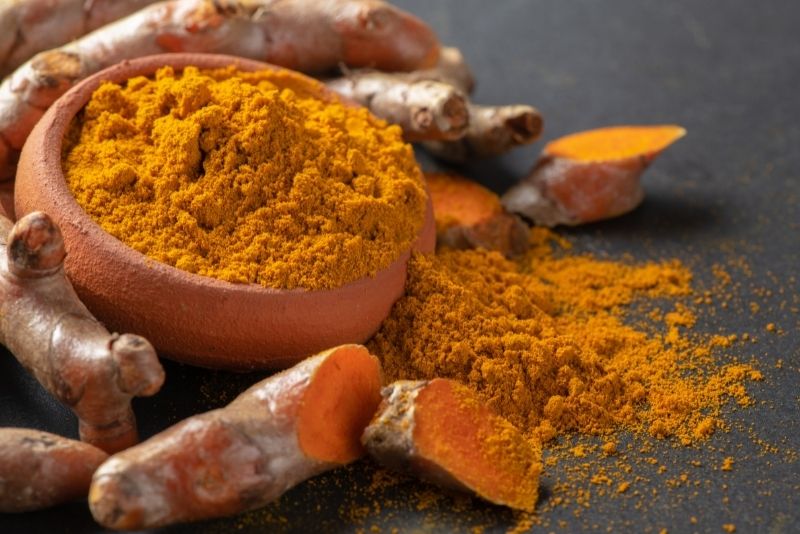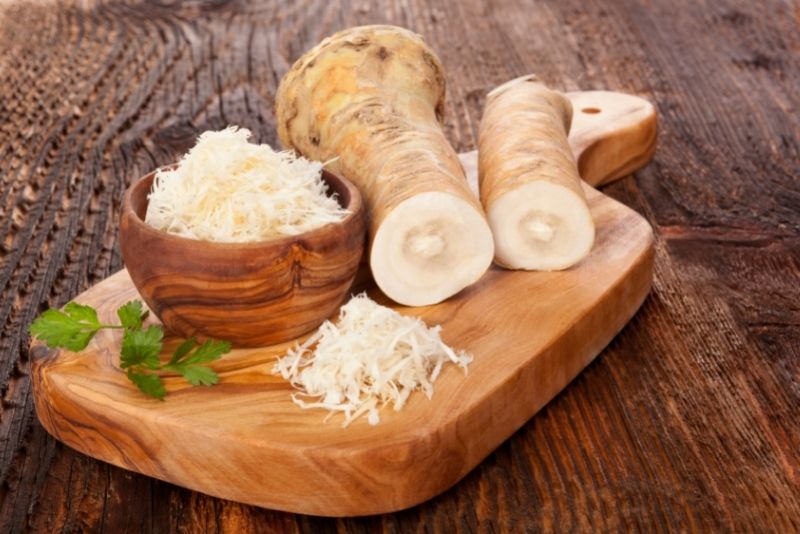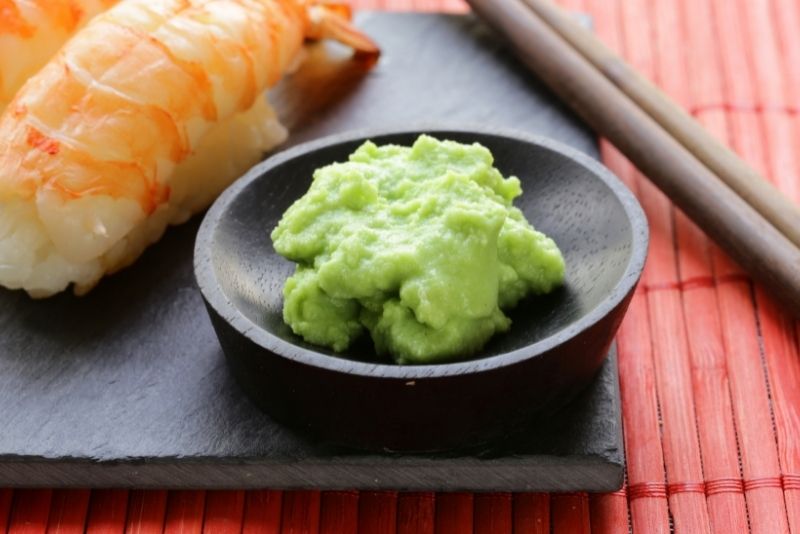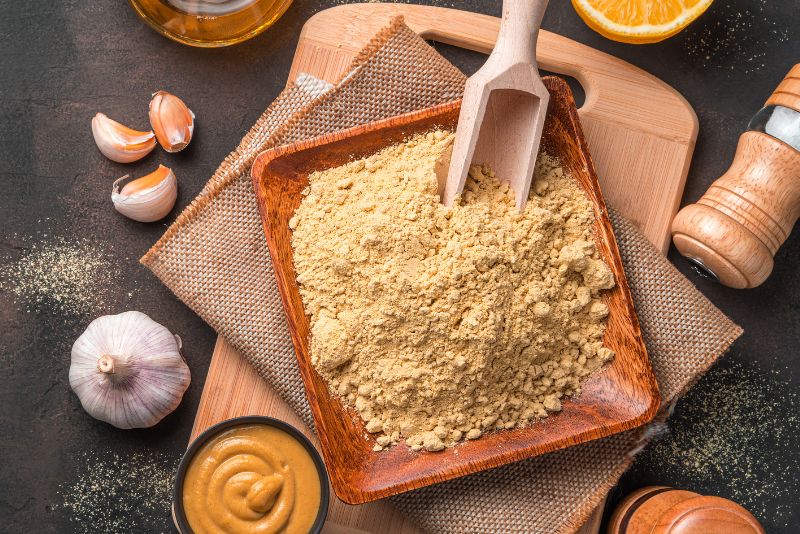Dry mustard is a spice that can be used as an ingredient in many dishes or as a condiment.
Its flavor profile is quite different from wet mustards and has more of a spicy zing to it. It is used frequently in recipes that call for mustard powder or mustard seeds.
Dry mustard is one of those ingredients that you always seem to be missing when you need it the most. It’s pretty annoying if you’re not prepared for this situation.
However, there are many different types of dry mustard substitutes you could use in your recipes and the best one for you depends on what you’re cooking and the flavor profile you want to achieve.
Cooking Tip: You should use a dry mustard substitute with similar flavor strength and acidity level as the recipe requires.
Table of Contents
5 Best Dry Mustard Substitutes
The best substitutes for dry mustard are Dijon and turmeric. You can also use wasabi, horseradish, and yellow mustard can also be used as sub for dry mustard in most recipes.
These dry mustard alternatives will provide a similar flavor to your dish, so choose the one that best fits your needs.
1. Dijon Mustard
Dijon mustard is one of the most common substitute for dry mustard you can find in most grocery stores. It is the best substitute to use if you’re looking for a spicier and creamier flavor.
Many people love it because it contains a good amount of pungency and acidity. It has a sharp, spicy flavor so it works well in recipes that call for prepared yellow or brown mustard.
The Dijon variety lends well to creamy dishes like salad dressings and sauces while brown spicy mustards give meat marinades and glazes a nice zing.
2. Turmeric

Turmeric has a similar flavor to dry mustard. It can be found in most grocery stores near the spices aisle where you would usually find yellow and brown mustards.
Turmeric is one of those spices that has tons of health benefits, so it’s great to use frequently!
Turmeric pairs well with curry powder, which makes an excellent dry mustard substitute as well.
You should pair turmeric with the same foods that you would pair dry mustard. For example, if your recipe calls for Dijon, use curry powder as a substitute because they both have very similar flavors.
The same goes if you’re looking to use either turmeric or yellow mustard seeds in your dish–you can always just combine them!
3. Horseradish

Horseradish is an ingredient that you should keep in mind when looking to use a dry mustard substitute or prepared mustard. It has a very similar flavor profile and can be used interchangeably.
Horseradish adds a nice kick to dishes adding some heat and acidity. Some examples of horseradish’s uses are as an ingredient in dressings, sauces, dips, soups, and marinades.
4. Wasabi

For all you sushi lovers out there (or even if you haven’t tried sushi yet), wasabi is another great ingredient to keep in mind when looking for a dry mustard substitute.
It has a sharp spicy flavor that makes it an excellent replacement for Dijon and yellow mustards.
If you’re looking for a little bit more of an exotic dry mustard substitute, try using wasabi.
Wasabi also has a ton of health benefits, so it’s great to add to lots of different dishes.
It pairs well with soy sauce and ginger, which makes a good substitute for the same reasons as wasabi – they have very similar flavors. You can use both in salads, sauces, dips, soups, and marinades.
5. Yellow Mustard or Stone-Ground Mustard
Yellow mustard is another option as a dry mustard substitute, as well as stone-ground mustard, which contains the same spices as yellow prepared mustards but without any added liquid or vinegar.
If you’re looking for a replacement that just has a slightly different flavor from traditional dry mustard, yellow mustard is the way to go.
It contains similar spices as dry mustard but has a little bit of sweetness to it as opposed to sharp heat.
Yellow mustard is not as strong-tasting as prepared mustards but it does add some flavor to dishes. It’s a great ingredient for dressings and marinades if you don’t want your dish to be too spicy.
What is Dry Mustard?
Dry mustard is the seed of the mustard plant that has been ground into a powder. It can be found in either yellow or brown colors.
The flavor profile is quite spicy so it’s often used for meat dishes to liven up their flavors. Dry mustard is also a common replacement for prepared mustard.
The flavor profile of dry mustard is quite different from the wet varieties such as prepared mustards. It is spicy and mouth-puckering, with a sharp zing to it.
Dry mustard can be used as an ingredient in many dishes and as a condiment, such as soups, salads, vegetables, sauces, and marinades.
It’s frequently used as a dry rub for meats, poultry, and fish. It can also be found in many dressings.
Frequently Asked Questions
What Does Dry Mustard Taste Like?
Dry mustard has a strong, pungent flavor that is often described as being hot and peppery. The flavor profile of dry mustards varies depending on the type but most have similar flavors.
It is frequently used as a spice in cooking and can be added to food to give it a bit of a kick. Dry mustard can also be used as a condiment, such as in mustard-based sauces or dressings. It pairs well with beef or pork dishes because of its ability to add a little bit of spice while not overpowering the flavor of the meats.
What’s the Difference Between Dry Mustard and Regular Mustard?
Dry mustard and regular mustard are both made from the same spices: brown and/or yellow mustard seeds, turmeric, and white or black pepper. The difference is that dry mustards don’t contain any liquids like water or vinegar.
The main ingredient in wet prepared mustards is vinegar whereas dry mustard contains no added liquid.
Can I Substitute Ground Mustard for Mustard Powder?
Ground mustard is another great substitute for dry mustard. It’s similar in flavor while not being as strong-tasting or spicy–it just adds a bit of warmth and some acidity to dishes.
If you don’t want your dish to be too spicy, then you can definitely swap ground mustard for dry mustard. When using ground spices, use a little less because they’re stronger than dry mustard.
Dry Mustard vs Ground Mustard vs Mustard Powder: Are They the Same Thing?
Although dry mustard, ground mustard, and mustard powder all come from the same spices, they’re not exactly the same thing.
Dry mustard is created when you grind brown and/or yellow mustard seeds into a fine powder with no added liquid or vinegar.
Ground mustard is made by grinding brown and/or yellow mustards seeds and adding vinegar or other liquids.
Mustard powder is ground mustard seeds that have been dehydrated to prevent them from turning into liquid. This means you can keep it on the shelf much longer than other types of prepared mustards!
How Do You Make Dry Mustard?
To make dry mustard, you need to grind brown and/or yellow mustard seeds into a powder with no added liquid or vinegar.
It doesn’t sound like something that’s possible but it is! You can do this by using an electric coffee grinder (a spice grinder will work) to turn the seeds into powder.
If you don’t have a coffee grinder, you can also use a mortar and pestle to grind the seeds into powder.
Final Words
With so many dry mustard substitutes available, it’s important to do your research and find the one that best meets your needs. Hope this article helps.
Please feel free to leave your comments and questions below! Thanks for reading.
